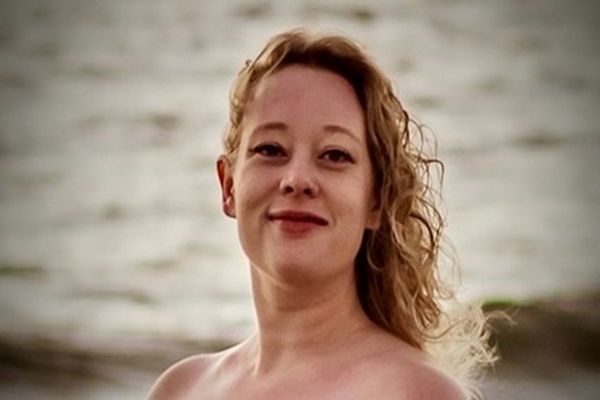
Lucy Andrews is sitting on the couch of her Mullumbimby home, scrolling through rows and rows of names on her computer.
“Everything that’s not highlighted are cases that haven’t been housed yet,” she tells Guardian Australia. “Or who are only in temporary housing and require permanent housing solutions.”
For the past week, Andrews and two other women – volunteers with social work experience – have been doing all they can to ease the vast crisis in emergency accommodation in their corner of the flood-ravaged northern rivers region of New South Wales.
Their work began last Tuesday, when one of the women sat down on the steps of Mullumbimby’s civic hall with a notepad and phone, and began offering assistance to anyone who needed emergency housing.
She was soon joined by another former social worker and Andrews, who sat at a trestle table from 8am to 8pm each day, creating spreadsheets of the displaced and homeless, triaging them and trying to link them up with safe, appropriate accommodation.
They’ve helped between 200 and 300 people find emergency housing.
“That’s the elderly, the young, parents, pregnant women,” she says. “Given it’s Mullum, a lot of people who are not registered anywhere, they haven’t been paying rent anywhere.”
The early work was done without funding, resources, or organisational structure.
Now, they’re working out of an office of the Mullumbimby neighbourhood centre on donated laptops. A piece of A4 paper has been Blu-Tacked to the door to a small room, housing a single volunteer. It reads “accommodation hub”.
The volunteers, burnt out, are hoping someone can take over their work. But, until then, the scale of the problem remains immense.
“The situation is ongoing and there’s no end in sight, right now, because there’s no one for us to hand over to, apart from other volunteers,” Andrews says.
The problem in Mullumbimby is replicated all over the northern rivers.
Hundreds are still stuck in evacuation centres. Others are sleeping on couches, in garages or at homeless shelters in places like Byron Bay.
On Andrews’ street alone, four of the houses have taken in displaced people.
Government data suggests that, of the 9,200 homes assessed in the northern rivers, 5,500 are damaged and 2,834 are not habitable. There are an estimated 1,234 people in temporary and emergency accommodation.
On Thursday the NSW premier, Dominic Perrottet, announced a $551m package, funded jointly by the state and federal governments, to attempt to address the crisis.
It included $248m for 16 weeks of rental support, including $6,000 payments for single-person households and $18,000 for larger families.
The government will spend $20m to give affected residents “pods” to live in on their land while rebuilding, and is providing $10m to supply temporary accommodation through mobile motorhomes. The government has also hired temporary housing at camping sites in the northern rivers, giving capacity for 270 people.
“We believe this is the support that will help people get through,” Perrottet said.
“We want people out of evacuation centres. We want people who have gone through the trauma and are unable to return home to get into accommodation.”
The region had been gripped by a housing crisis even before the floods. Private rentals were hard to find, and those that were available were exorbitant. Social housing was even more limited.
There’s been significant pressure on Airbnb to do more to offer up its properties – it is linked to 6,260 homes in the region, most of which are available to tourists for most of the year – and the company announced unspecified plans to provide free short-term accommodation for flood-affected residents on Thursday.
It’s an understatement to say the floods have compounded the problem, even in ways not immediately apparent.
Andrews, for example, has been served an eviction notice telling her she must leave her Mullumbimby rental. The landlord lost his property in the floods and needs the house back. That throws Andrews and her housemates into a search for housing along with those whose homes have been deemed unliveable.
Rebecca Whan, an architect and the Murwillumbah District Chamber of Commerce president, says the state government’s response will not solve the more fundamental problem with housing in the region.
She described the situation as “a catastrophe on top of an emergency”.
“The main thing that needs to be considered in a humanitarian crisis such as what we are experiencing now, is providing a level of dignity to people who have lost everything, in order to heal,” she said. “A family of five living in a caravan on their property is not good enough and the mental health toll as a result will be huge.”
Whan asks why the government cannot adopt a similar approach to that taken during the pandemic. Put people up in hotels in the short term, while they try to work out how to get back on their feet.
“I don’t really see another option, because we’ve run out of options here, in the short term.”
Even in Byron Bay, homelessness charities are feeling the impact.
The Uniting Byron Bay minister, the Rev Phil Dokmanovic, runs a service for those sleeping rough, opening up the church building during wet and extreme weather.
Stretchers are set up in the church. In the past week, they’ve been taking in people displaced by the floods.
“On Sunday, we had our worship gathering and we sort of set up chairs among the stretchers, and had our normal gathering, then packed things up and it resumed being a shelter,” he says.
Dokmanovic has been working in places like Mullumbimby. He says it is clear that the floods will exacerbate the existing problems.
“I would say without a doubt there is a huge shortage of accommodation as it is, and then you take out all these homes that are now unavailable for people to live in, and it’s only going to be worse.”







